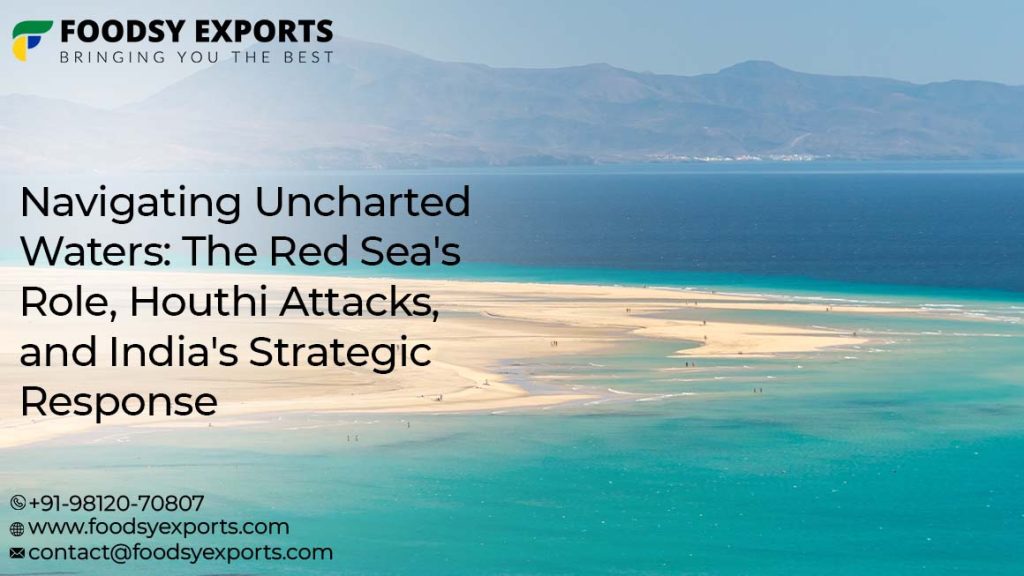Introduction
The Red Sea, a vital artery of global trade, is currently facing unprecedented challenges due to Houthi attacks and escalating tensions in the region. Beyond its significance in connecting Asia to Europe, this strategic waterway plays a crucial role in facilitating approximately 20% of India’s exports, reaching key destinations like Europe, the US East Coast, the Middle East, and African countries. As we explore the multifaceted repercussions of Houthi attacks, it becomes apparent that the implications are not confined to a single industry but have broader consequences for India’s economy. Additionally, understanding India’s cautious military engagement and focused maritime security measures is essential in navigating these complex waters.
Significance of the Red Sea
Asia-Europe Connection: The Red Sea acts as a linchpin connecting Asia and Europe, facilitating the smooth flow of goods and fostering economic ties between these major continents.
Global Trade Hub: Functioning as an economic hub, the Red Sea annually witnesses the passage of goods worth $1 trillion, significantly contributing to the global trade landscape.
Critical for India’s Exports: Approximately 20% of India’s exports navigate the Red Sea, reaching vital destinations such as Europe, the US East Coast, the Middle East, and African countries.
Container Traffic & Energy Transport: The Red Sea handles about 30% of the world’s container traffic and plays a crucial role in transporting 7-10% of global crude oil, highlighting its importance in global logistics and energy trade.
Effects of Houthi Attacks
Alternative Route Challenges: Disruptions in the Red Sea have forced ships to consider alternative routes, adding 8,900 kilometers and two weeks of travel time around the Cape of Good Hope, resulting in an additional cost of $1 million in fuel.
Freight Cost Surge for Basmati Rice: Freight costs for Basmati rice exports from India have surged from $600 to an astounding $2,000-$4,000, placing immense financial strain on rice exporters and impacting the competitiveness of Indian rice in the global market.
Rising Insurance Costs: Security risks have led to a surge in shipping insurance costs, with premiums rising from 0.2% to 0.5%. For a ship worth $100 million, this translates to a significant increase, ranging from $200,000 to $500,000 per voyage.
Global Trade Disruptions: With 40% less traffic passing through the Red Sea, global trade faces disruptions, impacting various industries that rely on timely and efficient transportation of goods.
Panama Crisis Fallout: Ships facing challenges in the Panama Canal crisis sought alternative routes through the Red Sea, encountering further complications and underscoring the complexity of the current maritime landscape.
India’s Strategic Response
No Direct Military Involvement: India has refrained from deploying military forces or participating in multinational naval operations in the Red Sea, reflecting a desire to avoid escalation and maintain neutrality in regional geopolitics.
Enhanced Maritime Security: India has significantly increased its naval presence in the Arabian Sea, extending to the northern reaches of the Red Sea. This includes warships, aircraft, and drones patrolling international shipping lanes to protect Indian commerce and cargo vessels, aiming to deter attacks and ensure the safe passage of Indian ships through potentially risky waters.
Diplomatic Approach: India actively expresses concern about the situation through diplomatic channels, emphasizing the importance of freedom of navigation, calling for de-escalation, and supporting a peaceful resolution of the conflict. This reflects India’s commitment to international law and regional stability.
Internal Preparations: Maintaining a high level of alert and preparedness for potential contingencies, India has developed contingency plans to safeguard Indian vessels and ensure the safety of Indian citizens in the region.
Conclusion
The Houthi attacks in the Red Sea have sent shockwaves through the global trade landscape, impacting not only immediate regions but also the broader international community. For India, a nation heavily dependent on the Red Sea for exports, the repercussions are extensive, necessitating adaptive strategies to navigate these uncharted waters. As businesses and policymakers grapple with the evolving geopolitical challenges, India’s cautious military engagement and focused maritime security measures stand as a testament to strategic foresight, emphasizing the importance of securing national interests while actively contributing to regional and global stability.




